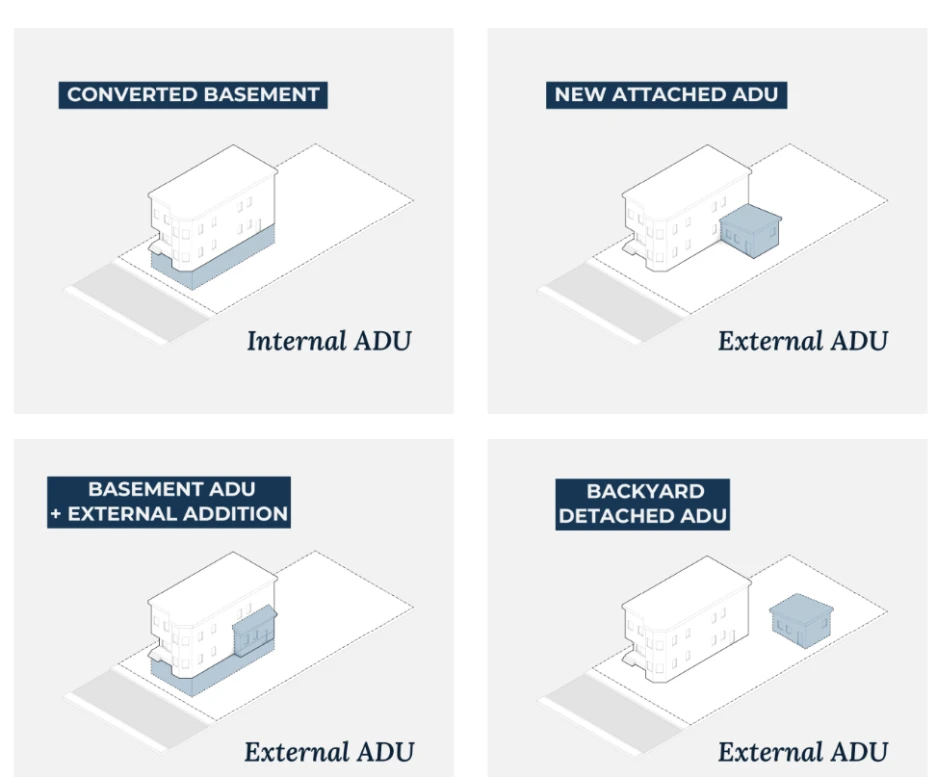Unlocking ADUs in Boston: Smart, Flexible Housing for Homeowners
Accessory Dwelling Units (ADUs)—also known as in-law apartments, secondary suites, or granny flats—are becoming a practical solution to Boston’s housing needs. Homeowners now have more opportunities to create these units thanks to city programs and recent statewide legislation.
What Is an ADU?
An Accessory Dwelling Unit is a self-contained residential unit on the same lot as your primary home. It includes a kitchen, bathroom, and sleeping area, functioning as an independent living space. Boston allows homeowners of 1-, 2-, or 3-family homes to create ADUs, provided they live on the same parcel (Boston.gov). These can be:
- Internal ADUs – basement or attic conversions.
- Attached ADUs – additions connected to your home.
- Detached ADUs – separate backyard cottages or small houses.

(Image Source: www.boston.gov)
Recent Rule Changes
As of 2024, under the Massachusetts Affordable Homes Act, ADUs of up to 900 sq. ft. are allowed by right statewide in single-family residential zones without a zoning variance—unless a municipality enacts specific restrictions (Mass.gov). This removes one of the biggest barriers homeowners faced in Boston: needing approval from the Zoning Board of Appeals for small ADUs.
Steps to Plan and Build Your ADU
- Research Feasibility
- Check local zoning maps and flood zone data (BPDA) and (FEMA Flood Map).
- Review the City’s ADU Guidebook for design and compliance requirements.
- Design & Compliance
- Follow Boston’s Design Checklist and Fire Safety Guidance to ensure your ADU meets building code.
- Permitting
- Apply through the Inspectional Services Department using a long-form building permit.
- Plan ahead—permit reviews can take up to 5 weeks.
Financial Assistance
- Technical Assistance Grant – reimburses eligible homeowners up to $7,500 for early design and permitting expenses.
- ADU Loan Program – provides 0% interest deferred loans up to $50,000, repayable upon sale or refinance.
Benefits of an ADU
- Multigenerational Living – keep aging family members close.
- Rental Income – generate passive income (note: short-term rental rules still apply).
- Property Value – increase market appeal with flexible living space.
The City views ADUs as part of its strategy to improve affordability and housing diversity.
Fire Protection & Safety Requirements
- Compliance with Massachusetts State Building Code (780 CMR) and Fire Code (527 CMR).
- Separate means of egress – a safe exit directly to the exterior.
- Hardwired smoke and CO detectors interconnected between ADU and main dwelling.
- Sprinklers required if the building already falls under state sprinkler rules (NFPA 13D may apply).
Considerations Before You Build
- Flood Zones – ADUs in FEMA flood zones must be above Base Flood Elevation.
- Local Restrictions – municipalities may impose height or setback limits.
- Parking – Boston generally does not require new parking for ADUs.
With new state laws, city incentives, and a clearer permitting process, Boston homeowners have a unique opportunity to add value to their property while supporting the city’s housing goals. Whether you’re building for family, rental income, or future flexibility, now is an excellent time to explore adding an ADU.
